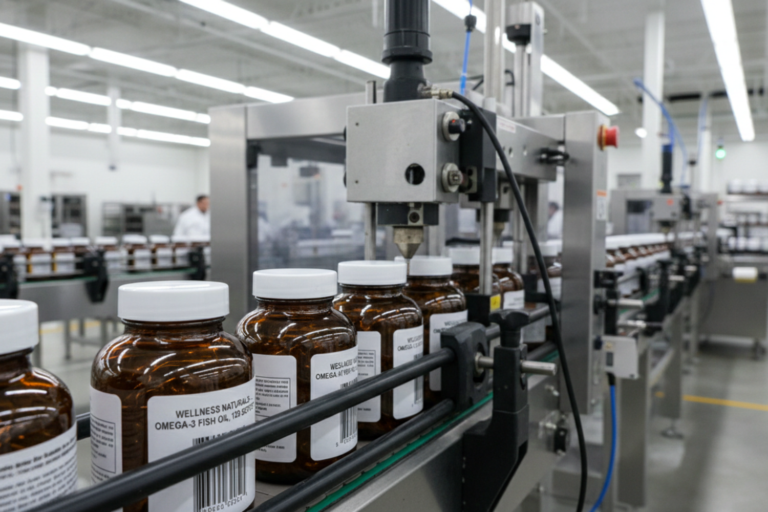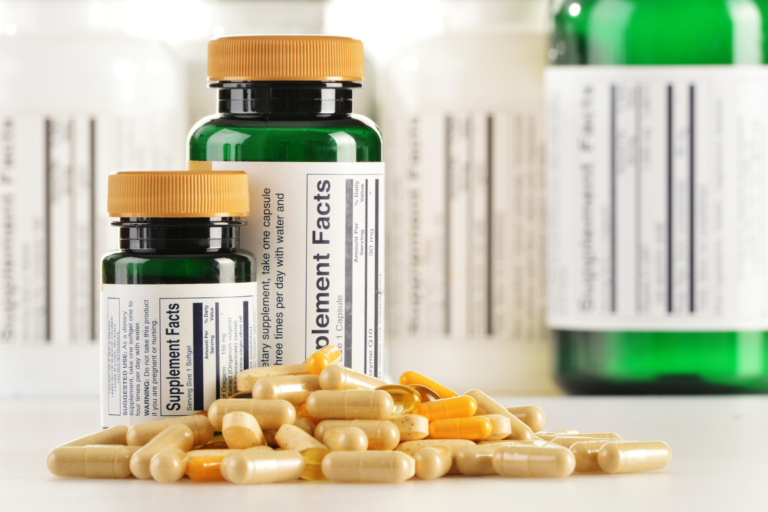The demand for anti-aging supplements continues to grow as consumers prioritize longevity, healthy aging, and maintaining younger-looking skin. Anti-aging products address external signs such as fine lines, wrinkles, and uneven skin tone and internal concerns like collagen production and cellular health.
These supplements are designed to address concerns such as skin texture and elasticity, though effectiveness may depend on individual use and product formulation. Nutrition brands that develop high-quality anti-aging products can position themselves as trusted leaders in this market by meeting consumer expectations for effective, science-backed solutions.

Understanding Anti-Aging Supplements
Anti-aging supplements combat the natural aging process by targeting visible signs of aging and improving overall health. These products support skin texture, elasticity, and cellular health, though results may vary based on the formulation and individual factors.
These supplements often include ingredients that may help reduce oxidative stress, support collagen production, and promote skin hydration. They may complement other skincare measures by supporting the body’s natural defenses against environmental stressors. Focusing on skin care and overall vitality, they contribute to long-term benefits like improved energy, reduced wrinkles, and enhanced skin health.
Common Use Cases
Anti-aging supplements offer versatile benefits for various needs. Common uses include:
- Supporting skin hydration and reducing fine lines to achieve younger-looking skin.
- Enhancing cellular health and energy levels for better vitality and healthy aging.
- Addressing joint health, improving bone density, and preserving muscle mass in aging individuals.
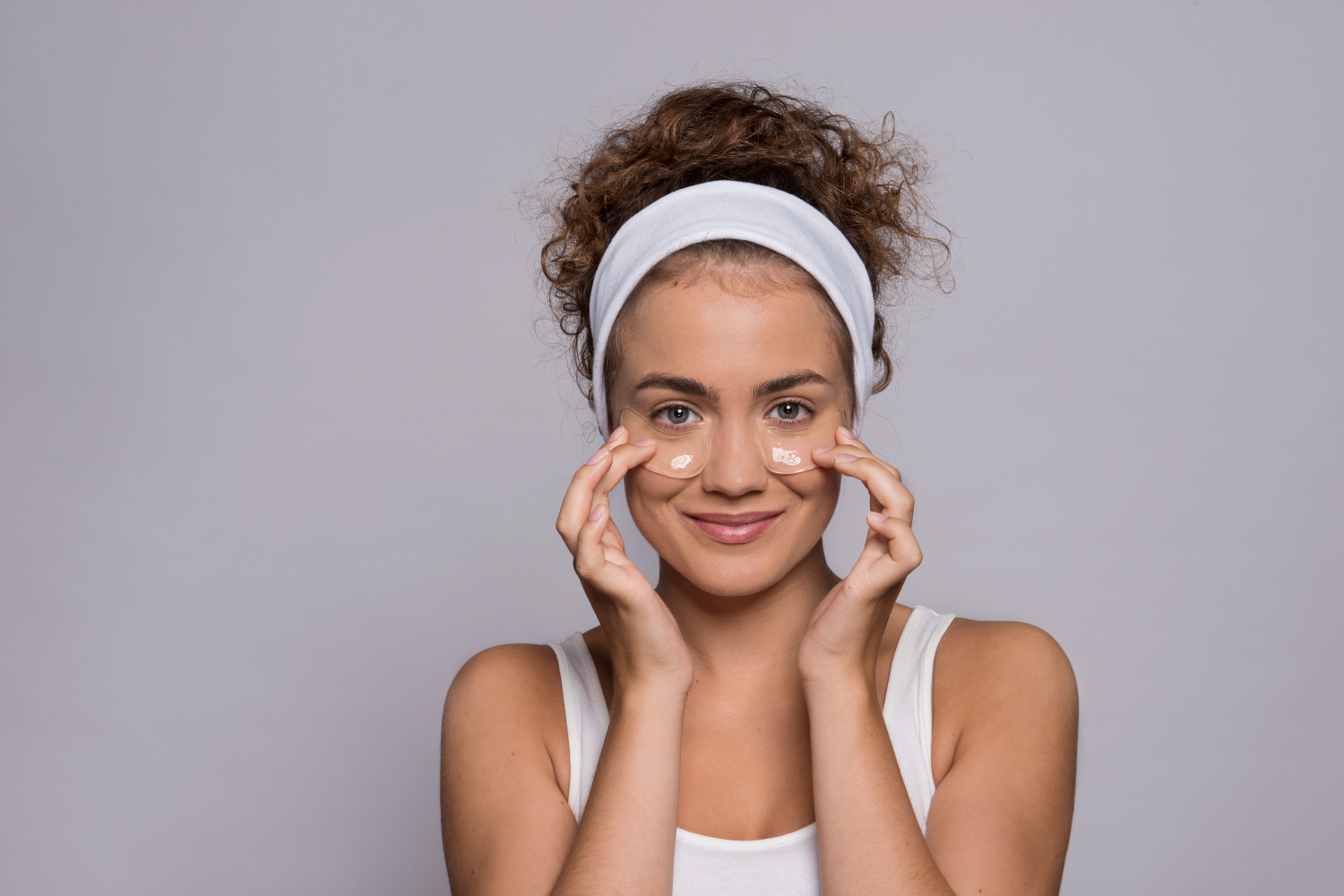
Common Types of Anti-Aging Supplements
Anti-aging supplements come in various formats, catering to different preferences and lifestyles. Popular formats include:
- Capsules/Tablets: Easy-to-use options often delivering antioxidants, coenzymes, and collagen peptides.
- Powders: Versatile blends designed for mixing into beverages, commonly featuring ingredients like vitamin C and hyaluronic acid.
- Gummies: A convenient and tasty way to consume nutrients such as biotin and collagen.
- Liquid Supplements: These are fast-absorbing solutions ideal for delivering collagen peptides and concentrated antioxidants.
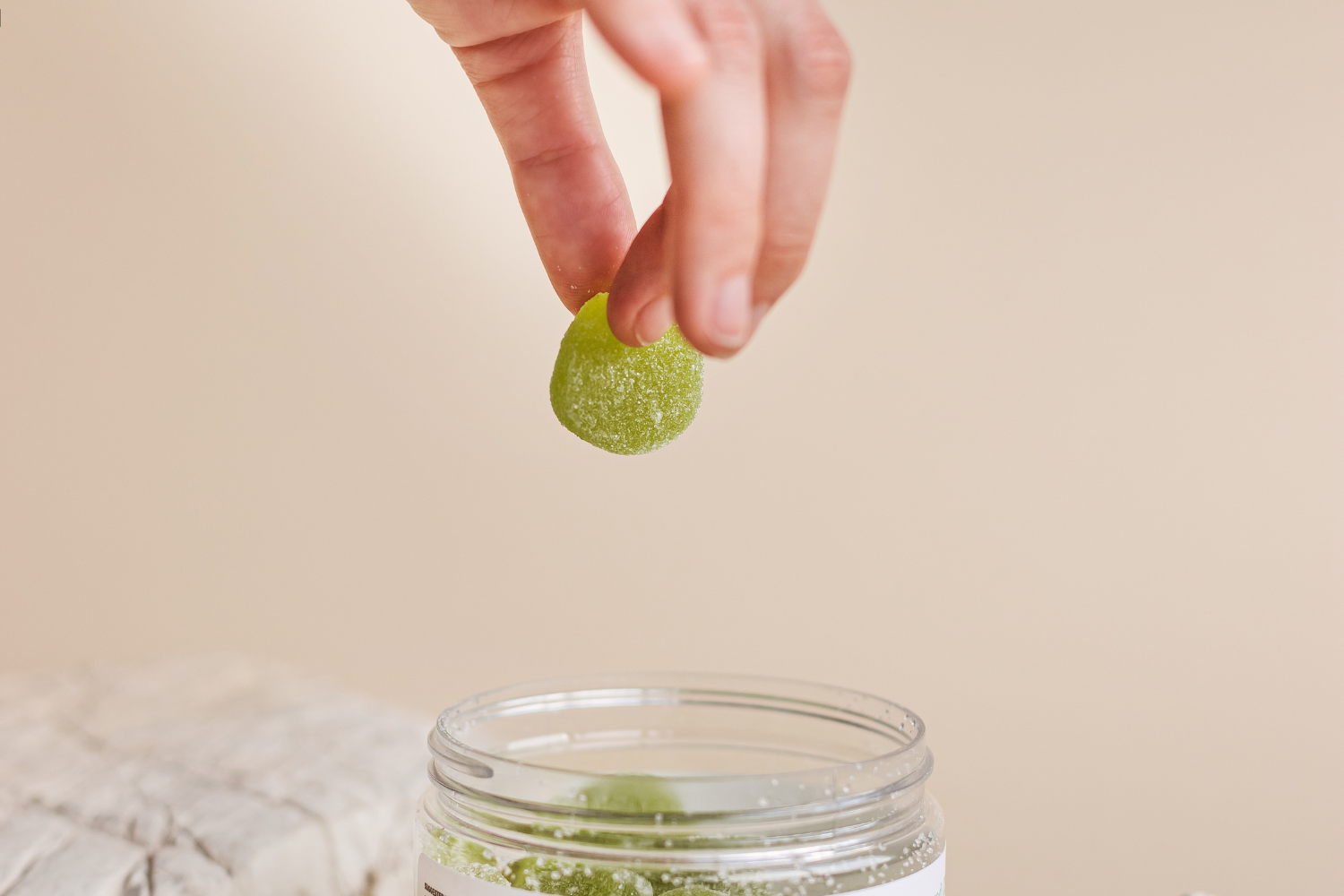
Benefits of Offering Anti-Aging Supplements
Anti-aging supplements provide significant opportunities for nutrition brands by meeting the growing demand for products that support healthy aging. These supplements appeal to consumers seeking solutions to enhance both their appearance and overall well-being.
Addressing a Universal Desire for Longevity and Vitality
Anti-aging products are widely appealing to health-conscious individuals who prioritize longevity and younger-looking skin. These supplements address concerns like wrinkles, dark spots, and uneven skin tone while promoting energy and vitality.
They are intended to support overall wellness by addressing cellular health and skin elasticity as part of a broader anti-aging strategy. By incorporating ingredients that improve skin tone and fight oxidative stress, these products support a balanced and proactive approach to healthy aging.
Expanding Product Lines for Niche Markets
Anti-aging supplements complement other categories, including skin care, joint health, and cognitive support. For example, products that reduce wrinkles and improve skin texture pair naturally with anti-wrinkle creams and retinol serums.
Bundling anti-aging supplements with beauty or wellness products creates opportunities to target niche markets. Combining collagen-based powders with antioxidants or offering multi-purpose kits enhances customer convenience and maximizes results.
Building Brand Trust with Clinically Backed Formulas
Clinically supported formulas are essential to building trust with consumers. Ingredients like resveratrol and collagen peptides, backed by anti-aging research, offer proven benefits such as reducing signs of aging and supporting cellular health.
Certifications like non-GMO, vegan, or allergen-free labels further appeal to health-conscious buyers. Highlighting clinical studies and certifications reassures customers that your products are safe, effective, and high quality.

Key Ingredients in Anti-Aging Supplements
Anti-aging supplements rely on powerful ingredients to address the visible signs of aging and promote overall health. Here are some of the most effective components to include:
Skin and Hair Health
Although individual results can vary, collagen peptides may help support skin elasticity and improve its structure over time. They help rejuvenate skin texture while boosting skin tone.
Hyaluronic acid promotes hydration and smooths the appearance of fine lines. This ingredient also combats skin irritation and helps maintain healthy, youthful skin.
Cellular Health and Longevity
Resveratrol is believed to aid cellular health and provide antioxidant benefits, which may help mitigate oxidative stress. It also aids in improving skin tone and reducing the risk of premature aging.
Nicotinamide Mononucleotide (NMN) enhances energy production and supports cellular repair. This nutrient plays a key role in combating the natural aging process.
Coenzyme Q10 (CoQ10) promotes mitochondrial function and reduces visible signs of aging. It also helps improve the appearance of blotchy skin.
Antioxidants for Protection
Vitamin C supports collagen synthesis and provides antioxidant protection against free radicals, which may contribute to skin damage over time. It’s also essential for reducing wrinkles and improving skin elasticity.
Vitamin E is known for its antioxidant properties and may contribute to skin health when used with other nutrients like vitamin C.
Joint and Bone Support
Glucosamine supports joint health and flexibility, making it ideal for aging populations concerned with maintaining mobility and reducing discomfort.
Calcium and vitamin D3 promote bone density and reduce the risk of osteoporosis. These nutrients are crucial for long-term effects on skeletal health.
Additional Nutrients
Omega-3 fatty acids are associated with potential anti-inflammatory benefits and may support heart and brain health. They also help address visible signs of aging, such as fine lines.
Zinc enhances skin healing, supports immune function, and reduces signs of skin irritation. It is an essential mineral for overall health and rejuvenation.
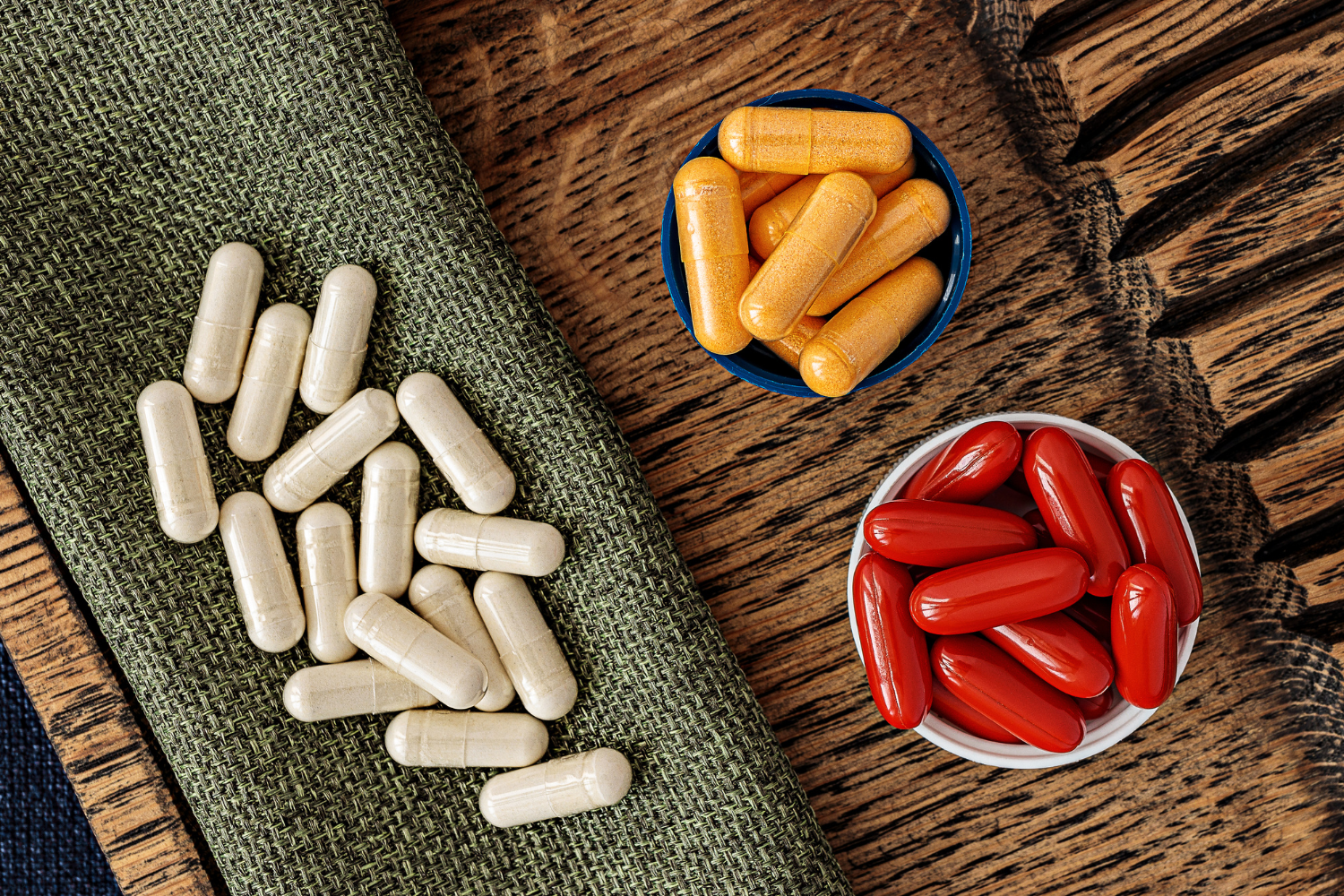
Steps for Nutrition Brands to Develop Anti-Aging Supplements
Developing anti-aging supplements requires careful planning to meet consumer needs and stand out in a competitive market. These steps ensure your products deliver targeted benefits while appealing to your audience.
Conduct Market Research to Identify Consumer Needs
Understanding your target market is essential. Focus on demographics such as beauty-conscious consumers, aging populations, and individuals looking to improve their skin texture and vitality. Identifying these groups helps tailor your offerings.
Explore trends in anti-aging supplements, including plant-based collagen, NAD+ boosters, and natural anti-aging therapies. Stay informed about consumer preferences for clean labels, sustainable practices, and clinically proven benefits.
Source High-Quality Ingredients
Partner with trusted suppliers who provide sustainably sourced, clinically validated ingredients like collagen peptides, hyaluronic acid, and NMN. These suppliers should meet regulatory standards to ensure safety and effectiveness.
Use third-party testing to confirm ingredient purity and efficacy. Highlighting certifications like non-GMO and allergen-free ensures consumer trust and compliance with industry standards.
Formulate for Targeted Anti-Aging Benefits
Combine complementary ingredients for specific anti-aging goals. For example, pairing collagen and hyaluronic acid enhances skin elasticity, while NMN and CoQ10 support cellular health and energy.
Develop targeted formulations to address niche needs, such as joint care, beauty enhancement, or overall healthy aging. Specialized blends help differentiate your products in a crowded market.
Design Packaging and Labels for Premium Appeal
Packaging plays a vital role in attracting consumers. Highlight key benefits, such as “reduces wrinkles” or “supports cellular repair,” to communicate value at a glance.
Use sleek, sophisticated designs that appeal to health-conscious buyers. Incorporating modern aesthetics and clear, informative labels builds trust and reinforces your brand’s professionalism.
Launch and Market Strategically
Educate consumers about the science behind anti-aging supplements through blogs, videos, and social media. Explain how ingredients like antioxidants and collagen combat the visible signs of aging.
Encourage first-time purchases by offering free trials or introductory bundles. These promotions increase brand exposure and allow consumers to experience the benefits firsthand.

Marketing Strategies for Anti-Aging Supplements
Effective marketing strategies are essential for building awareness and driving sales of anti-aging supplements. Educating consumers and creating value helps establish your brand in this growing market.
Educate Consumers About Aging Science
Simplify the science behind aging with engaging content. Explain how oxidative stress, collagen loss, and cellular repair affect the natural aging process.
Use infographics and videos to make complex topics accessible. Educational tools like these build credibility and encourage consumers to trust your expertise.
Partner with Wellness and Beauty Influencers
Collaborate with dermatologists, beauty experts, and lifestyle influencers who align with your brand’s values. Their endorsement adds authority and increases visibility among target audiences.
Highlight real-life testimonials and success stories. These authentic accounts demonstrate the effectiveness of your anti-aging products, building trust with potential customers.
Offer Value with Bundles and Subscriptions
Create product bundles that pair anti-aging supplements with complementary items, such as beauty-enhancing vitamins or joint health blends. These packages appeal to consumers seeking comprehensive solutions.
Provide subscription discounts to encourage repeat purchases and foster loyalty. Long-term use enhances results, which leads to higher customer satisfaction and retention.

Meeting the Growing Demand for Anti-Aging Supplements
The demand for anti-aging supplements continues to rise as consumers seek products that support longevity, vitality, and a youthful appearance. Nutrition brands can tap into this market by focusing on high-quality, clinically validated formulations that cater to diverse consumer needs. Transparency, efficacy, and premium positioning are key to building trust and loyalty among customers. By delivering effective solutions with clear benefits, brands can establish themselves as leaders in the anti-aging space while meeting the expectations of health-conscious consumers.
Frequently Asked Questions
What certifications should anti-aging supplements have?
GMP certification, third-party testing, and allergen-free or sustainably sourced certifications as applicable.
How long does it take to develop anti-aging supplements?
Typically 6–12 months, including formulation, testing, and regulatory approval.
What are the most popular ingredients in anti-aging supplements?
Key choices include collagen peptides, resveratrol, NMN, CoQ10, and hyaluronic acid.
Are anti-aging supplements safe for daily use?
Most are safe when used as directed, but formulations should adhere to recommended dosages.
Can anti-aging supplements be combined with other products?
Yes, they pair well with beauty supplements, cognitive boosters, or joint health products for comprehensive wellness solutions.
References
- Brown, K., Theofanous, D., Britton, R. G., Aburido, G., Pepper, C., Sri Undru, S., & Howells, L. (2024). Resveratrol for the Management of Human Health: How Far Have We Come? A Systematic Review of Resveratrol Clinical Trials to Highlight Gaps and Opportunities. International journal of molecular sciences, 25(2), 747. https://doi.org/10.3390/ijms25020747
- Dröge W. (2003). Oxidative stress and aging. Advances in experimental medicine and biology, 543, 191–200. https://doi.org/10.1007/978-1-4419-8997-0_14
- National Institute of Arthritis and Musculoskeletal and Skin Diseases (2023). Bone Health and Osteoporosis | NIAMS. https://www.niams.nih.gov/health-topics/bone-health-and-osteoporosis
- U.S. Food and Drug Administration. (2025). Dietary Supplement Labeling Guide. https://www.fda.gov/food/dietary-supplements-guidance-documents-regulatory-information/dietary-supplement-labeling-guide
- Wang H. (2021). A Review of the Effects of Collagen Treatment in Clinical Studies. Polymers, 13(22), 3868. https://doi.org/10.3390/polym13223868

